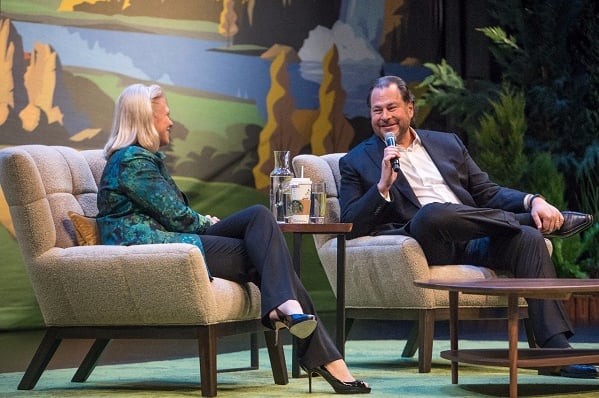Author: Jeff Bullas / Source: Jeffbullas’s Blog

I remember one of my first mobile phone calls. It was to my grandfather and it took place nearly 30 years ago.
He had grown up in the early 20th century and his first business venture was a milk delivery round. He delivered bottles of milk to people’s front porches by horse and cart.
Those days are long gone.
His reaction to his first call from a cell phone while driving a car without wires connecting to a piece of copper was priceless and a memory that will stay with me forever. It was also a time when I was working in the computer industry selling personal computers to corporations as the computer revolution took hold.
That era is also a distant memory and we have moved into the future at such a fast pace that the new normal today is change. It means we need to be adapting and reinventing how we live and work.
This emerging and exciting future was discussed and revealed in detail at my first visit to Dreamforce in San Francisco that I attended just a few days ago.
Here are the 5 key insights that captured my attention and imagination at an event that attracted 170,000 attendees.
1. The 4th Industrial Revolution and the complexity of change
This revolution can be summarised as “Intelligence” as the scale of data and information needs decisions to be managed with technology that extends and amplifies what it means to be human.
The 8 key technologies that lie at the centre of this revolution are:
- The Internet of things (IOT)
- Quantum computing
- Robotics
- Artificial intelligence (AI)
- Nanotechnology
- Autonomous vehicles
- Biotech
- 3D printing
The science for all of these can be complex and overwhelming to the average person in the street.
These technologies are also combinatorial and the impact of the intersection of these tech forces means that the pace of change is accelerating. That is a challenge to us as humans and as entrepreneurs and leaders.
For more background to this complexity a book worth reading is “The Fourth Industrial Revolution” by Klaus Schwab.
2. The rise of AI
It is estimated that in just the last five years we have created as much data as the entire history of mankind. The scale of the data, its management and complexity requires an enhancement to our human limitations.
We need to use the power of AI to gain insights and create modelling that enables us to make better decisions. Additionally, customers are starting to expect it as part of service. Facebook, Google, Apple and Amazon all have AI powered assistants that are evolving quickly. Consumers will increasingly use digital personal assistants to interact with consumer services in the connected home.
Using AI in marketing can be applied to but not limited to the following:
- Customer satisfaction
- Increasing engagement
- Building smart…
Audience Team
The digital audience insights you need to build, manage and market to your digital audiences.

